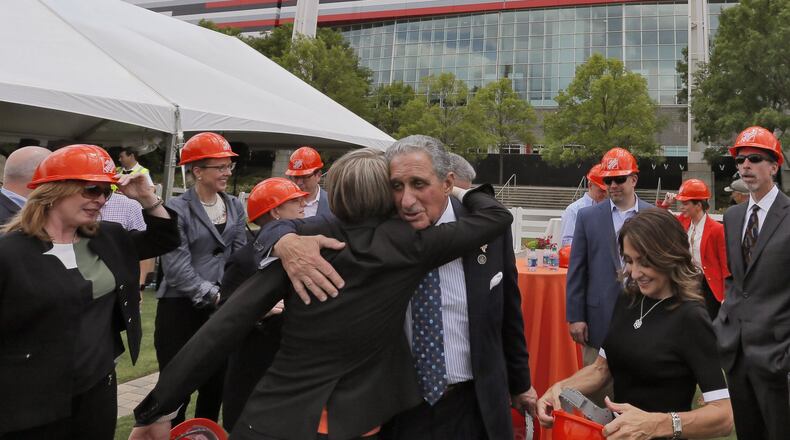More than two decades after it cut off the communities around Vine City and English Avenue from downtown, the Georgia Dome is giving way to a public park that residents there can call their own.
Officials with Home Depot and Mercedes-Benz Stadium, the new home of the Atlanta Falcons, announced plans to create Home Depot Backyard, a 13-acre park that will replace a portion of the Dome site when it is demolished later this year.
This will be a space “where we celebrate, whether it be culture, whether it be music, whether it be food, whether it be arts,” Home Depot co-founder and Falcons owner Arthur Blank said at a Friday press conference unveiling the plans.
“When we are in touch with each other physically and humanly, we are at our very best,” Blank said.
The Dome, which opened in 1992, is being replaced by Mercedes-Benz Stadium, which is under construction just across the street. The Falcons said earlier this week that steel installation issues on the stadium's roof will delay the opening of the stadium, the third such delay.
The park, which will open in 2018 and will be joined in the future by an 800-to-1,000 room hotel on the Dome site, will be used for game day parking, arts and culture events, entertainment and community activities, the officials said.
But a big goal of the greenspace is to demonstrate that the grounds of a stadium can be a year-round asset for nearby communities, not just a game-day facility.
“The last 20 to 30 years, sports stadiums have gotten a bad rep,” said Frank Fernandez, vice president of community development for The Arthur M. Blank Family Foundation. “They leave the city. They are open only 10 to 20 times a year and are ghost towns, especially football stadiums. And they don’t do much to lift up the community around them.
“Mercedes-Benz Stadium is now beginning to change that narrative,” he said.
The Dome was often criticized by residents of Vine City and English Avenue, two of the city’s poorest neighborhoods, as acting as wall that denied them participation in Atlanta’s good financial times. Many of the streets that connected the community to downtown dead-ended into the Dome and residents fled to areas with better services.
Officials with the Falcons and the Blank Foundation have invested millions in the community as part of the agreement to dedicate $200 million in Atlanta hotel-motel tax collections to pay for the $1.5 billion stadium. Some of the efforts have included job placement and career education through Westside Works and hundreds of thousands of dollars in grants and low-interest or no-interest loans to community groups.
“This stadium is being done differently than any other stadium in the United States of America in terms of the way it is embracing the community,” said Mayor Kasim Reed in remarks after the announcement.
About the Author




